Man Dumps Wife Over Weight, Lies She Cheated, Family Turns On Him
OP (37F) divorced her ex-husband (38M) about nine years ago. They’d married young, at 19, and split in their mid-20s when OP developed binge eating disorder (BED), gained weight, and her husband admitted he was no longer attracted to her. The divorce was mutual, relatively painless since there were no kids, and OP moved on. She’s now remarried with two children.
Recently, OP ran into her ex-sister-in-law (SIL) at the mall. They chatted pleasantly until SIL mentioned she’d always been surprised about “how it ended.” When pressed, SIL explained that OP’s ex had told the family she cheated. Shocked — because that never happened — OP clarified the real reason: weight gain, BED, and loss of attraction. SIL seemed surprised but believed her.
A few days later, OP’s ex called furious. The truth had spread through his family and apparently caused trouble in his current marriage. OP feels conflicted: on one hand, she simply told the truth when asked. On the other, she didn’t expect it to blow up in his personal life. Now she’s left wondering if she was out of line.
Some people only fall in love with their partner’s physical appearance, not with who they are

The poster married her boyfriend when they were 19, but she started gaining weight in her mid-20s and he didn’t like it
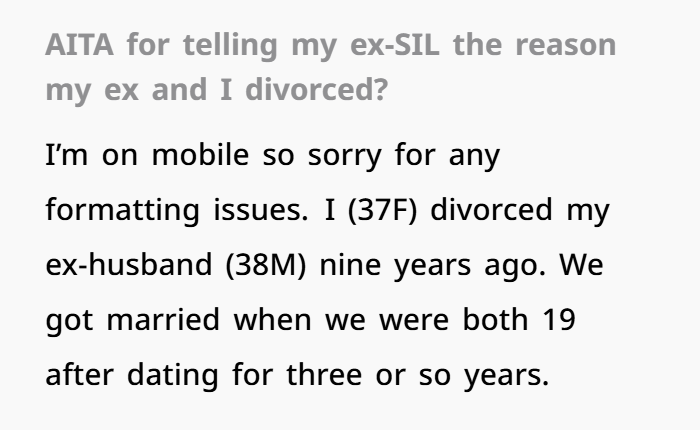
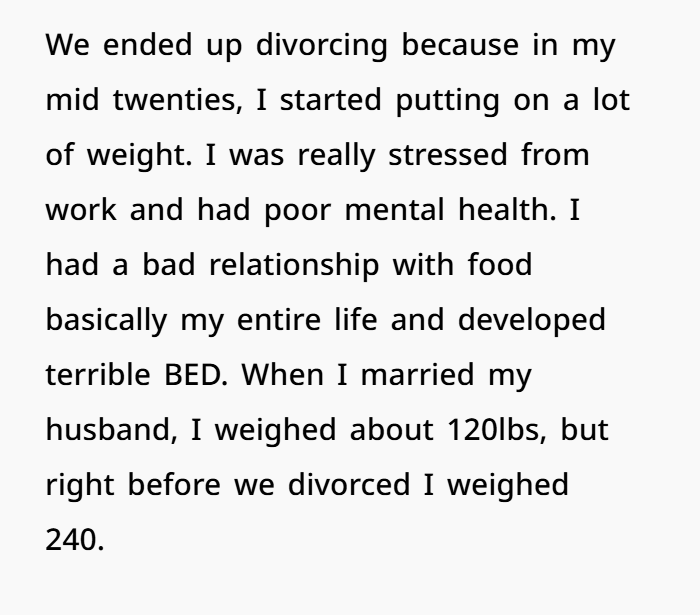
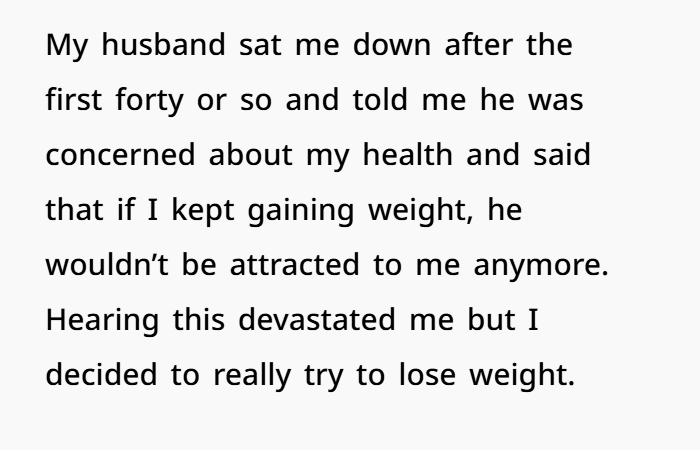
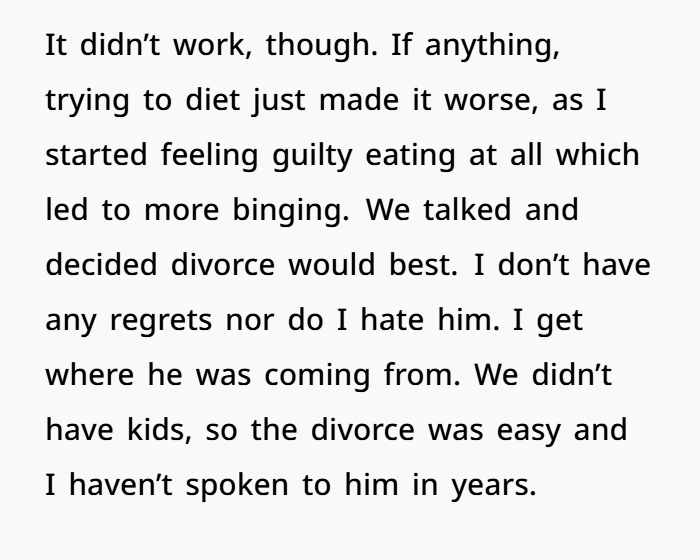

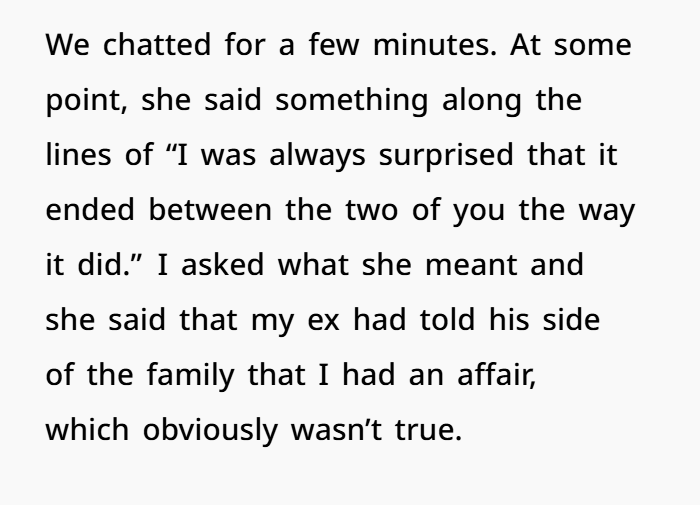
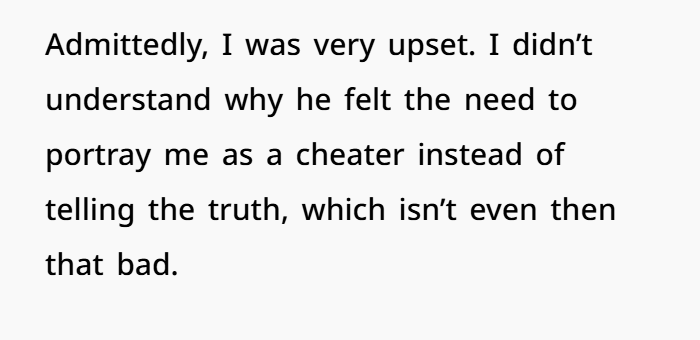


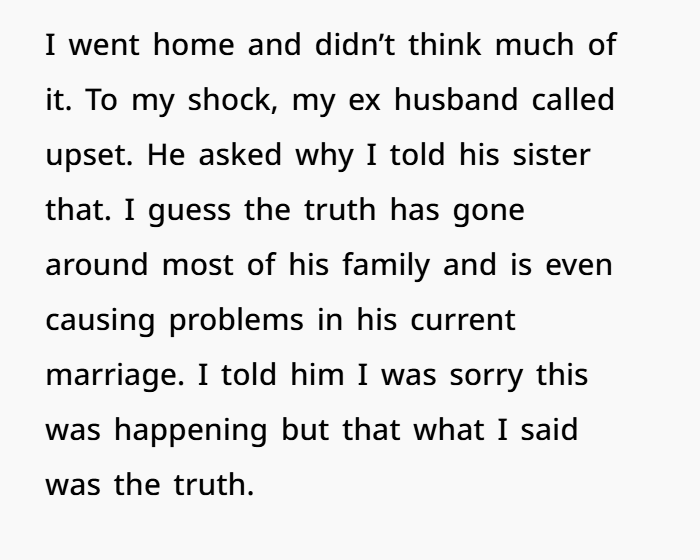
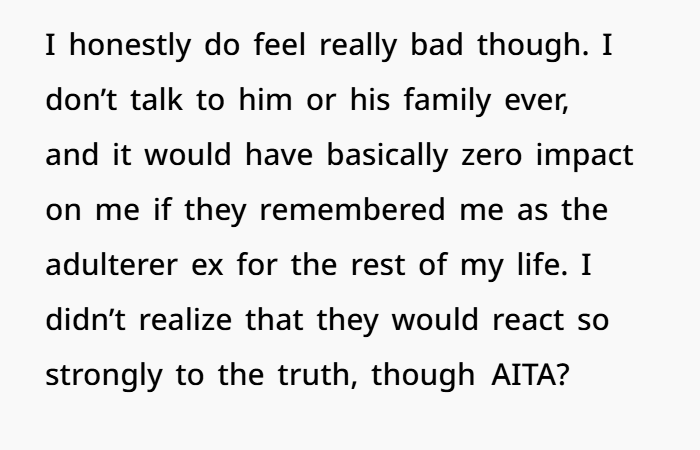
This story hits on some big themes: honesty, reputation, stigma, and how much responsibility we owe exes for the stories they tell about us after divorce. Let’s walk through the moving parts.
1. Why people lie about breakups and divorces
First up — your ex lying about why you split is unfortunately super common. Studies show that around 42% of people “reframe” or outright lie about the reason for a breakup when telling others, usually to protect their own image or avoid shame.
For your ex, telling his family “she cheated” may have been easier than admitting:
- He divorced you because of weight gain, which would make him sound shallow.
- He wasn’t attracted anymore, which could make people judge him as cruel.
- He couldn’t “fix” the relationship, which might make him feel like a failure.
So, instead of owning that, he picked a narrative where he was the victim and you were the villain. Hurtful, yes, but psychologically pretty textbook. People default to stories that make them look better, especially around family where reputation lingers.
2. The weight stigma angle
There’s another layer here: weight stigma. Society often treats weight gain — especially in women — as shameful, weak, or unattractive. Admitting “I divorced my wife because she gained weight” might not only have made him look shallow but could have sparked family judgment like: Why didn’t you support her? or That’s so superficial.
So in his mind, “she cheated” was the lesser evil. It made him look betrayed instead of shallow. Of course, it also threw you under the bus permanently.
3. Your right to reclaim your truth
Here’s the thing: he’s free to tell whatever story he wants about himself, but once he drags you into it, you absolutely have the right to correct the record. When your ex-SIL directly said “I thought you cheated,” you were under no obligation to sit there and let a lie define you.

Boundaries matter, but so does dignity. Why should you carry the weight of being mislabeled an adulterer forever just so he doesn’t face consequences in his new marriage? That’s not your job.
4. Why he’s mad now
Your ex being furious now is telling. He’s not angry about “the truth” itself — he’s angry about loss of control. For almost a decade, he curated a narrative. His family pitied him, rallied around him, and probably thought of you as the bad guy. Now, that rug’s been yanked out, and he’s scrambling.
It’s also worth noting: if this is “causing issues in his current marriage,” that’s on him, not you. Either his current wife feels betrayed that he lied about his past, or she’s questioning his values (e.g., leaving someone over weight). Either way, it’s fallout from his choices, not yours.
5. The “should you have let it go?” argument
Some might argue: why not just smile, nod, and let SIL believe whatever? You weren’t close to that family anymore, so why rock the boat? And sure, that would have spared him drama. But it also would have meant swallowing a lie about yourself yet again.
Long-term, silence eats at self-respect. There’s a reason therapists often encourage people to “own their story.” It’s not about revenge — it’s about not letting others dictate your truth.
6. Legal vs. social responsibility
Legally, you did nothing wrong. People can speak the truth about their own experiences — it’s not slander, it’s not defamation, it’s just facts. Socially, though, some might argue you “broke an unspoken rule” of leaving the past buried. Divorce often comes with a “don’t talk about it” clause, even unofficially.
But that social contract goes out the window when one party lies in a way that damages the other’s reputation. You didn’t dig up dirt — you simply corrected misinformation when asked.
7. Case parallels
- A woman posted online about discovering her ex had told everyone she was an alcoholic, which wasn’t true. She finally corrected someone years later, and the ex blew up, claiming she “ruined his credibility.” Most people sided with her — lies don’t get lifetime protection.
- In celebrity culture, we see this constantly: when one side tells a false narrative post-divorce, eventually the other “sets the record straight.” Public sympathy almost always goes toward the person clarifying, not the one maintaining a lie.
So in context, you’re hardly alone in facing this dynamic.
8. Your lingering guilt
What you’re feeling now — guilt — is normal. You didn’t want to cause problems for his marriage, and you don’t even care much what his family thinks of you. But guilt doesn’t equal wrongdoing. Often guilt comes from conditioning: women especially are taught to keep the peace, avoid conflict, and “not make waves.”
But in this case, you didn’t make waves. You revealed there were already lies under the surface. The waves were always coming; you just stopped holding them back.
Folks instantly sided with the poster but questioned why she even felt guilty in the first place for outing such a shallow man

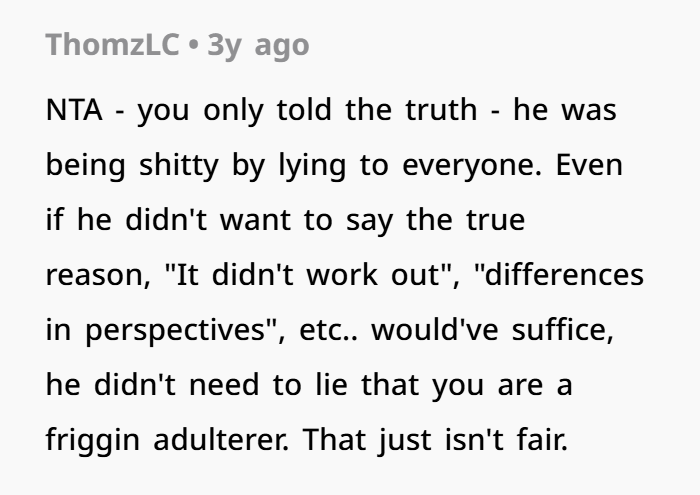

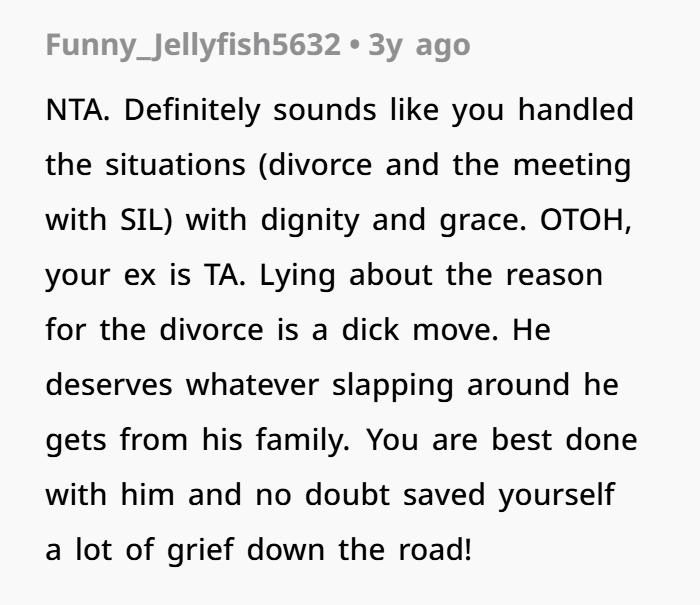

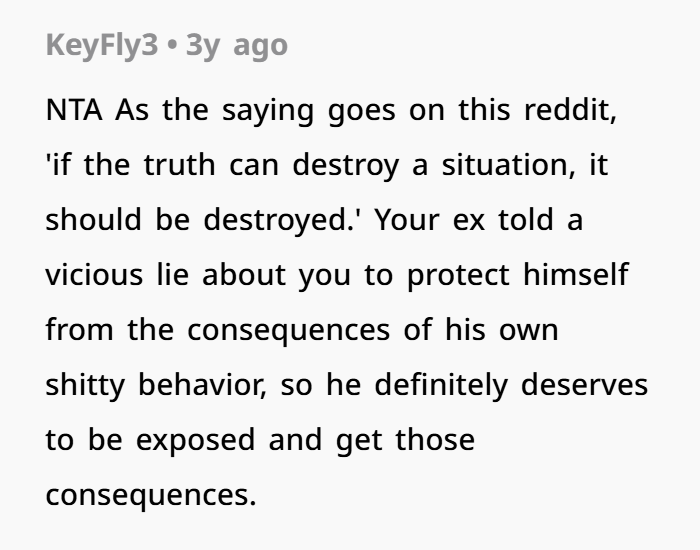

NTA. You didn’t set out to smear him. You simply told the truth when directly asked. If his family is upset, that’s because he lied for nearly a decade, not because you spoke honestly for one conversation.
Could you have stayed silent? Sure. Would that have spared him? Maybe. But it also would have meant living with a false narrative that painted you as a cheater. You chose dignity over silence, and that doesn’t make you the asshole.

